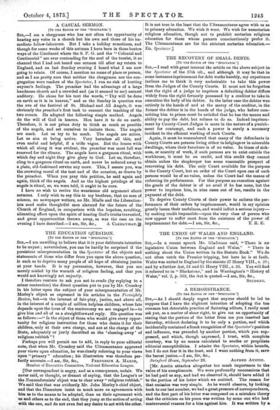THE RECOVERY OF' SMALL DEBTS.
[To THE EDITOR OF THU "SPECTATOR,"] read with great interest the article on the above subject in- the Spectator of the 27th ult., and although it may be that in some instances inprisonment for debt works harshly, my experience inclines me to think it very undesirable to take this power from the Judges of the County Courts. It must not be forgotten that the right of a judge to imprison a defaulting debtor differs widely from the right formerly possessed by a creditor to take in execution the body of his debtor. In the latter case the debtor was. entirely in the hands of and at the mercy of the creditor, in the the debtor is in the hands of the judge, who before com- mitting him to prison must be satisfied that he has the means and ability to pay the debt, but refuses to do so. Indeed imprison- ment by County-Court Judges is more in the nature of a punish- ment for contempt, and such a power is surely a necessary incident to the efficient working of such Courts.
Again, it must be remembered that many of the defendants in County Courts are persons living either in lodgings or in miserable dwellings, where their furniture is of no value. In times of sick- ness, or scarcity of work, if such persons are to exist outside the workhouse, it must be on credit, and this credit they cannot obtain unless the shopkeeper has some reasonable prospect of recovering his debt. The only Court available for the purpose is the County Court, but an order of the Court upon one of such persons would be of no value, unless the Court had the means of enforcing its performance. For this purpose an execution against the goods of the debtor is of no avail if he has none, but the power to imprison him, in nine cases out of ten, results in the payment of the debt.
To deprive County Courts of their power to enforce the per- formance of their orders by imprisonment, would in my opinion, greatly lessen their usefulness, and would inflict a serious injury-- by making credit impossible—upon the very class of person who now appear to suffer most from the existence of the power of imprisonment for debt.—I am, Sir, &c., T. R. E.


































 Previous page
Previous page